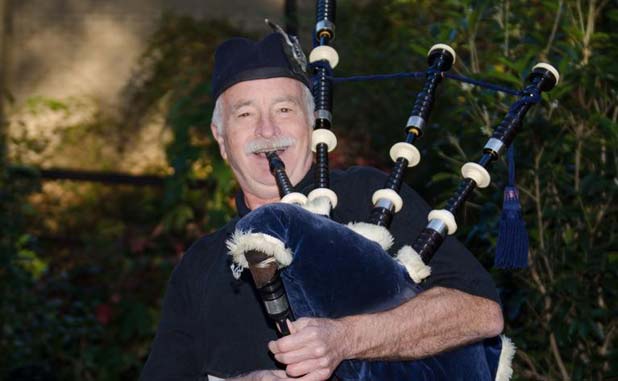[Editor’s note: This essay first appeared in “The Voice.”]
I have lived in Peachtree City, Ga., for 16 years. It is a planned community some 25 miles south of the Atlanta airport. The home of many, many veterans as well as men and women on active duty, it has to be one of the most patriotic of towns in this ever-so patriotic state.
It has over a 120 miles of paved golf cart trails and most households own a cart. At the local high schools hundreds of carts are parked each day during the school season.
Quite naturally, then, one of the dominant themes of its annual Fourth of July parades, which are held on one of its divided parkways, is a sort of laid-back, golf cart-rich affair enjoyed by thousands who are sitting within touching distance on either side of the blocked-off, northbound lane.
Such a parade needs a pipe band — or better yet, two or three. For that matter, it could use a lot more bands, period. This year [2014] not even the local high school band turned out.
All that being said, for many years on the morning of the parade I have donned my kilt, taken up my pipes, and gone over to where the parade forms up.
There always I find the firemen with their trucks, the police color-guard, Revolutionary War-era soldiers and ladies, World War Two re-enactors, and Veterans of Foreign Wars forming up at the front of the parade. And among them there is not one, single musical instrument.
Behind them hundreds of vehicles with politicians, trucks carrying business banners and sports teams, Scouts, and similar groups are lining up. Here and there some recorded music is blared out. Here and there may be a rock or Christian band with drum and generator-powered electric guitars.
For years I have gone there and found a place that needs some music. I am always welcome, and usually that place is right up front behind the color guard and ahead of the Revolutionaries. With a volley of shots fired into the air from their flintlock rifles, the whole parade steps off at 9 a.m. sharp. I strike up and start playing.
Having taken up the pipes at 40, I’m not a great piper by any measure, but I think I get a good tone out of my pipes and have a firm enough repertoire to entertain myself and the thousands of people who line the route. I’m getting along in years, but I can still play continuously for the whole two miles or so of the parade.
In addition to “Scotland the Brave,” “Patty’s Leather Britches,” “Duncan Robertson,” “Garry Owens” and the like, I play “The Marine Corps Hymn,” the “Army Song,” “Anchors Away!” and that all-time favorite, “It’s a Grand Old Flag,” as well as an upbeat version of “Come Thou Font of Every Blessing.”
All along the way I see more pretty women in an hour than I did in 10 days in Sweden. Healthy, happy soccer moms in their hundreds are out having a great morning with their children. They wave and smile at me. Their menfolk are there, too, and the pipes stir their martial vigor and their manly pride; their children look on with fascination.
A thought I have been having is this: I derive more pleasure from being in that parade than do the thousands do who are watching, for they observe the long procession from static locations, and that which they see goes by with but few musical offerings, only one of which is the bagpipe.
I, on the other hand, am blessed by seeing our music bring smiles to the faces of thousands of parade-watchers, young and old. The sound I make through which I walk is nearly continuous.
The pretty women, the nostalgic oldsters, the proud veterans, the awestruck toddlers, and even the rarely-impressed teenagers are all smiling. They are waving their flags and taking pictures as we come into view and into earshot. They are proud, and they are grateful for the sounds of the pipes being played as in the days of yore!
So it is that I get more out of the music than they do. They needn’t thank me at all, but they do with their smiles and winks, their thumbs-up gestures and their cheers. When I think back on those days, it is I who by this writing, am thanking them.
So that begs the question, fellow EUSPBA members: Are we not fortunate among men?
Therefore I urge you — as if pipers need encouragement — get out there and find a place that needs music and fill it up! Especially on the Fourth of July.
Walker Chandler
Peachtree City, Ga.
[Walker Chandler has been a EUSPBA member since the early ’90s and has been a member of the Culloden (Ga.) Pipe Band and the Mercer University Pipes & Drums. He is a member of the Burns Club of Atlanta.]









Leave a Comment
You must be logged in to post a comment.